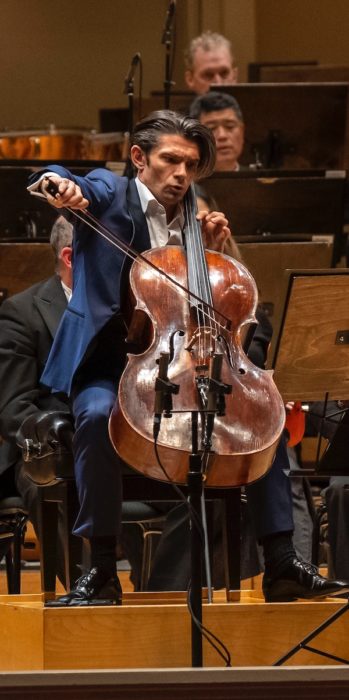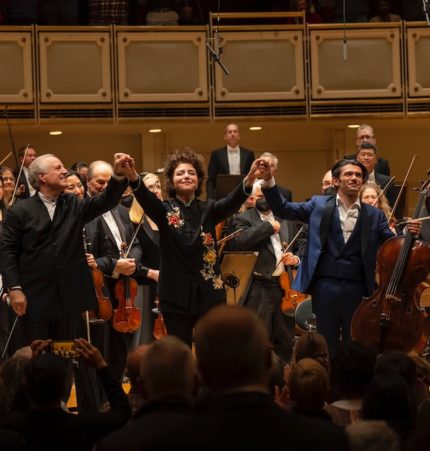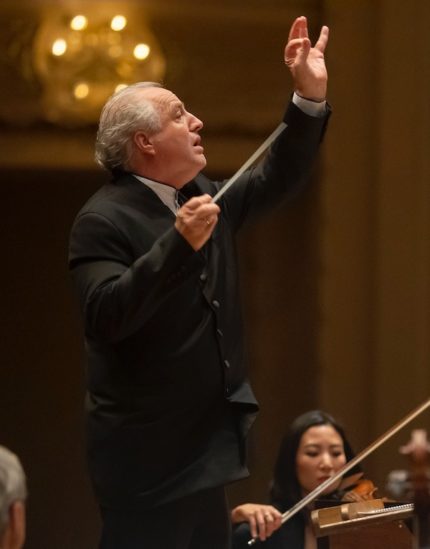A dark, compelling premiere and potent Shostakovich from Honeck, CSO

Be it music, literature or painting, the greatest works of art tell us as much about our time as the era in which they were created, often doing so with surprising insight and immediacy.
The Russian program performed by the Chicago Symphony Orchestra under Manfred Honeck Thursday night was a case in point. In the spotlight was Shostakovich’s Fifth Symphony as well as Lera Auerbach’s Diary of a Madman, a cello concerto played by soloist Gautier Capuçon and presented in its U.S. premiere.
Auerbach is one of our most gifted and prolific composers. Born in Russia and long resident in the West, she has written extensively in every medium, an output that encompasses operas, three symphonies, four concertos for violin, and a host of instrumental and chamber works including nine string quartets. Her oeuvre even boasts a huge, environmentally minded work for piano, chorus and orchestra titled ARCTICA.
Diary of a Madman was inspired by the short story of the same name by Nikolai Gogol, the Russian writer who also inspired an opera from Auerbach. The tale tells of the insignificant government clerk Poprishchin who becomes increasingly unhinged, gradually losing his grip on reality until he goes insane altogether.
In her program note Auerbach states that, while she did not realize a parallel while writing the work, after Russia’s invasion of Ukraine, she now sees an “eerie resonance” between the grandiose delusions of Gogol’s protagonist and those of Vladimir Putin.
Auerbach also movingly relates the harrowing tragedies visited upon her family under the Soviet regime; not least a great-grandfather who she says was tortured to death by Stalin’s secret police in one of their anti-Jewish purges.
Unfortunately, the program note doesn’t have a single word about the actual music in Diary of a Madman, so audience members have to fend for themselves.
Cast in a single substantial movement, the concerto is characteristic of Auerbach’s stark style— extreme contrasts in material, tempo and dynamics—set against an overall atmosphere of bleak rumination and gloom.
The concerto begins with barely audible high tendrils from the cello soloist, quickly seguing into a burst of aggressive agitation. The orchestra enters with chimes in music that continues in a dominant atmosphere of darkness and unease.
And so it goes with the solo protagonist playing of quiet passages, at times with portamento slides, set against restless, roiling orchestral music—here a lamentatory trombone solo, distorted folkish snatches and sleazy dance music for low brass. Bursts of fast music for the cellist alternate with fragile, lyrical sections that seem like nostalgic memories of happier times.
A surprisingly traditional cadenza leads to more orchestral vehemence until the music slows and the cellist finishes where he began—closing with a soft high note on a long-drawn diminuendo to silence.
While hardly a light-hearted romp, Diary of a Madman is reflective of Auerbach’s unique if desolate style. The concerto is surely crafted and compelling though at its present 35-minute length, the music begins to feel a little repetitious after the halfway mark. Some judicious pruning might make for an even more convincing and successful work. (The CSO co-commissioned Auerbach’s concerto along with three other orchestras.)
No reservations need be had about the performance. Gautier Capuçon provided poetic and masterful advocacy for Auerbach’s music, handling the technical challenges with ease and communicating an affecting human quality throughout in his refined, expressive playing.
Honeck’s detailed yet concentrated direction of this challenging score showed the conductor just as impressive in this new work as in the Austro-German cornerstones. He drew polished and kaleidoscopic playing from the orchestra, and soloist, conductor and composer were all warmly applauded in solo bows for their efforts.

The concerto was preceded by Glinka’s indestructible Ruslan and Ludmila Overture. Honeck led a fast, exhilarating reading with especially dazzling violins. The muddled woodwinds not so much.
Auerbach’s work formed a seamless prelude to Shostakovich’s Symphony No. 5, even employing some of the same offbeat scoring (including celesta).
The famous tale of how the premiere of the “heroic” Fifth restored Shostakovich to the good graces of Stalin and the Russian cultural commissars is well known, even if the composer’s abject apologia that came with the score (“A Soviet artist’s reply to justified criticism”) remains cringeworthy.
Honeck led a straightforward Fifth, which, if not quite revelatory, delivered a taut, powerful and notably well-played performance of Shostakovich’s most popular work.

Perhaps inevitably, the malign militaristic march of the opening movement took on an unsettling contemporary significance. While he gave the aggressive moments emphatic punch, Honeck allowed the fleeting moments of sunlight to come through, organically building to a grinding climax. The Scherzo was more biting and edgy than jocular with acute dynamic marking across all sections.
The heart of this performance came with the Largo. Honeck and the musicians charted this somber meditation from the plaintive opening statement in the second violins to a growing emotional intensity. The conductor was especially good at drawing playing of hushed concentration, winnowing the violins down to a mere sliver of tone.
Honeck took the rambunctious finale at a crackling pace. Even with a subtle broadening of tempo for the final section there was little sense of Volkov-ian irony at the coda, here put across with massive power and weight, blasted out by stentorian brass and pounding timpani.
A bland oboe solo apart, the playing was consistently superb throughout with especially fine contributions from timpanist David Herbert, associate concertmaster Stephanie Jeong and guest harpist Eleanor Kirk.
Honeck is a dynamic podium presence who draws consistently inspired performances from the CSO. With his impressive handling of the Auerbach premiere, especially, the Austrian conductor must continue to figure high on any short list of potential successors to Riccardo Muti.
The program will be repeated 8 p.m. Saturday and 3 p.m. Sunday. cso.org
Posted in Uncategorized





Posted Nov 18, 2022 at 2:57 pm by niloiv
I was really impressed by the Auerbach piece, but also agree that a program note more focused on the music could be helpful, for something that probably 99% of the audience hearing for the first time.
I arrived at the concert hall early, and used the time to read Gogol’s story, then tried to map some of the plots to the music and, as expected, found little success doing so.
But the music is certainly beautiful for its own worth
Posted Nov 20, 2022 at 12:02 am by Ed Clinton
This was an excellent performance of the Auerbach concerto. It is well- written modern music. It isn’t what I would call inspiring..
Posted Nov 20, 2022 at 7:45 pm by Howard C
Berlin Philharmonic is a very very fine orchestra but I’m not sure if they have the knock-you-out-your-socks immensity of sound that CSO exhibited this afternoon during the Shostakovich performance. Very few orchestras in the world can demonstrate such stability at such high intensity and sustain it. I was certainly in brass heaven today!